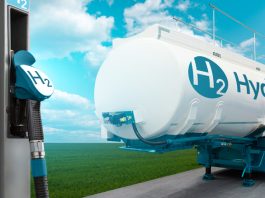Jorgo Chatzimarkakis, CEO of Hydrogen Europe, EUSEW’s partner organisation, discusses Europe’s role in the global energy transition and the importance of investment in clean hydrogen sources.
“The best time to plant a tree was 20 years ago. The second-best time is now.” In a world driven by short-term thinking and instant gratification, this timeless adage rings true. In the context of the energy transition and the urgent race to combat climate change, it’s more relevant than ever.
Europe has already begun investing in wind energy and solar power over the past two decades. However, had we started earlier, immediately after Professor James Hansen’s groundbreaking testimony to the US Senate in 1988, Europe could be in an even stronger position today.
Instead of focusing on past delays, we should focus on how to avoid repeating the same mistakes.
Hydrogen: The future of clean energy
Hydrogen stands as a critical enabler in the global energy transition, offering a promising pathway to decarbonise hard-to-abate sectors.
As a versatile and sustainable energy carrier, clean hydrogen can be used across multiple applications including sustainable steel production, manufacturing fertilisers and chemicals, and fuelling road, maritime, and aviation mobility systems. These sectors are difficult to electrify and benefit greatly from hydrogen’s flexibility, especially for long-haul journeys where battery propulsion falls short.
Moreover, hydrogen is a valuable tool for long-term energy storage and grid balancing, which will become even more crucial as Europe moves towards a fully renewable electricity grid.
The potential of clean hydrogen is immense and spans across industries and geographies.
Europe’s hydrogen projects leading the way
Several European projects showcase the transformative power of hydrogen.
In Sweden, H2 Green Steel, Europe’s first greenfield steel mill in 50 years, is replacing coal with green hydrogen, reducing CO2 emissions by up to 95%. In France, Lhyfe produces renewable hydrogen from wind energy, supporting industrial users and zero-emission bus and freight fleets. In Italy, Fincantieri, a leading shipbuilder, is designing hydrogen-powered cruise and cargo ships.
These success stories highlight Europe’s potential to lead the global market in renewable hydrogen production, transportation, and usage. However, failure to act swiftly could result in Europe losing its competitive edge, as seen in the solar and battery industries, where European-led innovation failed to capitalise on market opportunities.
Challenges facing the hydrogen economy in Europe
Despite significant projects, only 4% of global hydrogen projects reached Final Investment Decisions (FID) last year, with most of them located in China. This delay can largely be attributed to the higher cost of producing renewable hydrogen in Europe compared to fossil fuel-based alternatives.
However, with the right policy support and investments, hydrogen can become a viable option for businesses seeking to reduce emissions and accelerate the energy transition.
China’s success in clean technology
China’s success in leading the clean technology market through state-led innovation offers a key lesson for Europe. With the urgent need to combat climate change, Europe cannot afford to wait for the economics of hydrogen to perfect themselves. Investment now is essential for long-term growth and competitiveness. It must plant the seeds for a clean hydrogen future today.
Europe’s efforts to close the hydrogen financing gap
Europe has already made strides in closing the financing gap for hydrogen development. Initiatives like the European Hydrogen Bank and the Important Projects of Common European Interest (IPCEI) programme are critical in providing funding support to hydrogen production projects.
However, more is needed, both at the European and national levels, to build momentum and ensure Europe’s hydrogen sector remains competitive.
Strengthening hydrogen deployment in Europe
The European Commission’s Clean Industrial Deal is another step forward, introducing state aid support for hydrogen use in industry, as well as for renewable energy rollouts. These measures lay the foundation for hydrogen deployment, but more investment and stronger incentives are necessary to accelerate the energy transition.
Europe has publicly pledged its commitment to hydrogen, with hundreds of companies already investing in the sector. But to turn this commitment into a thriving market, national governments must speed up the adoption of EU legislation and consider implementing their own funding mechanisms for hydrogen projects.
A sustainable, competitive hydrogen future
By planting the seeds for clean hydrogen deployment now, Europe will reap the rewards of a strong, competitive hydrogen market. This will not only help achieve ambitious decarbonisation goals but also create new jobs, increase resilience, and bolster global competitiveness.
The time to act is now, to ensure a clean, sustainable future powered by hydrogen.









